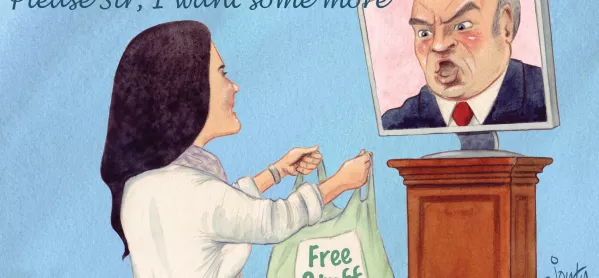It is a truth universally acknowledged that a teacher in possession of a meagre classroom budget must be in want of free stuff.
Maybe it’s having to deal with budgets that are never quite big enough, year after year, that leads a lot of teachers (myself included) to be the way we are. I think that something happens to you when you become a teacher. Your inhibitions when it comes to asking for favours and discounts from the general public - if you had any in the first place - seem to dwindle. You develop nerve you didn’t know you had.
I’ve pulled in favours from magazine editors, who gave up their time to do online interviews with children, bagged donations to be used as prizes from local shops and businesses for children organising a charity raffle and had visitors, from scientists to MPs, give their time freely.
That’s the thing, isn’t it? The “don’t ask don’t get” attitude tends to work out quite well, because, generally, people are really helpful when it comes to donating things and time to schools. We seem to be a good cause and for that, I’m eternally grateful.
‘We think things online should just be free’
I do wonder, though, if this experience of getting stuff for free is spilling over into our expectations of gathering new resources, particularly online. The way people view online content in general probably doesn’t help. I think there is an attitude among a significant number of people from all walks of life that things online should just be free; that they’re not “real” and somehow appeared from nowhere. That’s why the huge number of illegal film and music downloads continues daily. And I imagine that most people don’t think about the real consequences of that, such as creating an unsustainable film industry.
Just the other day, I spotted a tweet from a teacher exclaiming that they didn’t want to pay for their resources, and it made me think. Obviously, plenty of teachers share resources they’ve made for free (not least on the TES website), which is great. But can we - and should we - really expect not to have to part with any money for quality resources?
I’ve seen first-hand what ed tech start-ups have to put into creating a quality product - and that is lots of planning, time and effort. Don’t get me wrong, many do put out free samples or offer trial access and this is hugely important for schools that are making decisions about how to spend their budget. But that can’t be it.
If we continue to expect freebies, then it could put the quality resources we want our pupils to have access to in jeopardy. So, make the most of the plethora of free stuff you can find online. But when you come across a resource that you can see has had a lot of time spent on it and you recognise its value, don’t shy away from this - because some things do have a price worth paying, even if they’re online.
Claire Lotriet is a teacher at Henwick Primary School in London. She tweets @OhLottie and blogs at clairelotriet.com




